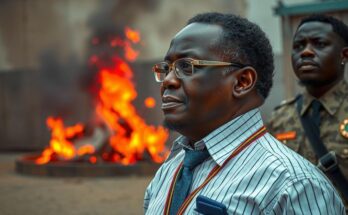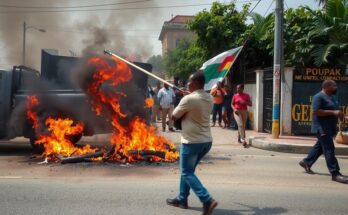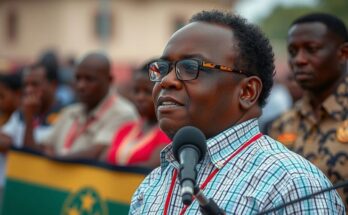Mozambique is set to hold a presidential election on Wednesday to choose a successor to President Filipe Nyusi, with around 17 million voters registered. The ruling Frelimo party has fielded David Chapo as its candidate, facing competition from independent Venacio Mondlane and others. Key issues include ongoing violence from jihadist groups, food insecurity, and corruption, as the nation seeks stability and progress amid challenging circumstances.
Mozambicans are poised to vote in large numbers on Wednesday for their next president and members of the parliament and provincial assemblies, following the end of President Filipe Nyusi’s two-term tenure. Approximately 17 million eligible voters from a population of 31 million are registered for this crucial democratic exercise. The ruling party, the Front for the Liberation of Mozambique (Frelimo), is anticipated to maintain its dominance, although various candidates are actively campaigning, seeking to effect substantial change in a nation beset by a persistent jihadist insurgency in the north and grappling with the impacts of climate change along its extensive coastline. Over 1.3 million individuals have been displaced due to violence linked to the insurgency, while countless others are experiencing severe food shortages triggered by ongoing drought conditions. The recent local elections were marred by claims of electoral fraud and rigging, which resulted in unrest in the capital, Maputo, though concerns appear to be less pronounced for the upcoming presidential election. David Chapo, a former governor of Inhambane province and the candidate for the ruling Frelimo party, is considered a frontrunner. He will likely face significant competition from independent candidate Venacio Mondlane, a banker and forestry engineer running under the slogan “Save Mozambique, this country’s ours.” Mondlane is backed by the Optimistic Party for the Development of Mozambique, and he previously alleged that he was robbed of victory in last year’s local elections. Other contenders include Lutero Simango of the Democratic Movement of Mozambique, a group that broke away from the rebel group-turned-opposition party Renamo, and Ossufo Momade, the current head of Renamo. Key issues dominating this election include the ongoing insurgency in Cabo Delgado, development challenges stemming from the violence, and high unemployment and hunger exacerbated by severe droughts. Corruption scandals, such as the infamous “tuna bond” case, have further tarnished Frelimo’s reputation, complicating its electoral hopes. The voting process will be followed by immediate counting and the distribution of partial results, with official outcomes to be confirmed by the National Election Commission within 15 days, pending the resolution of any potential disputes.
The presidential election in Mozambique occurs in the context of significant social and political challenges, including a protracted jihadist insurgency that began in 2017 and has devastated communities in the northern Cabo Delgado province. The violence has resulted in mass displacement and destruction of infrastructure, compounding existing issues of poverty, food insecurity, and unemployment. Mozambique has a historical backdrop of dominance by the ruling Frelimo party since its independence from Portugal in 1975. Recent local elections have raised concerns regarding electoral integrity due to allegations of fraud and vote rigging, thus creating a potentially charged atmosphere for the current presidential race. The candidates vying for leadership must address not only the immediate concerns of security and economic stability but also the long-term issues of governance and corruption that have haunted the country.
The impending presidential election in Mozambique represents a critical juncture in the nation’s political landscape, with significant implications for the future governance and socio-economic development of the country. Despite the ruling Frelimo party’s expected retention of power, the presence of formidable challengers suggests a growing desire among the electorate for change. The candidates’ responses to pressing issues such as the insurgency, food security, and the corruption scandals will be pivotal in shaping public sentiment and electoral outcomes.
Original Source: apnews.com




